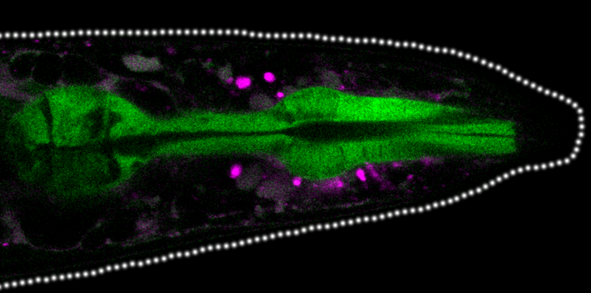News
09.11.2020
Boosting the quality of extracellular proteins
Researchers at the IFIB and DZNE Tübingen map the protein quality control network outside the cell, and highlight its role in aging and infection.
Keeping proteins in their correct and functional shape is crucial for all living organisms. Multiple mechanisms protect proteins inside cells. In contrast, little is known about how proteins in the extracellular space are kept in a healthy shape. Yet, the accumulation of aberrant extracellular protein aggregates is a major problem in several diseases such as Alzheimer’s disease and type II diabetes. Using a novel C. elegans model to study extracellular protein aggregation, the David lab discovered multiple new ways to maintain the quality of proteins outside the cell. The researchers found that better extracellular protein quality control prevented the accumulation of extracellular aggregates, delayed aging and surprisingly, also helped the animals survive longer during a pathogenic attack.
The study was published in Nature.
For further information on this study, see this press release.
Publication:
Gallotta, I., Sandhu, A., Peters, M. et al. Extracellular proteostasis prevents aggregation during pathogenic attack. Nature 584, 410–414 (2020). DOI: https://doi.org/10.1038/s41586-020-2461-z
Contact:
Dr. Della David
University of Tübingen
Interfaculty Institute of Biochemistry
Phone: +49-7071-29-74784
della-crystal.david@uni-tuebingen.de

